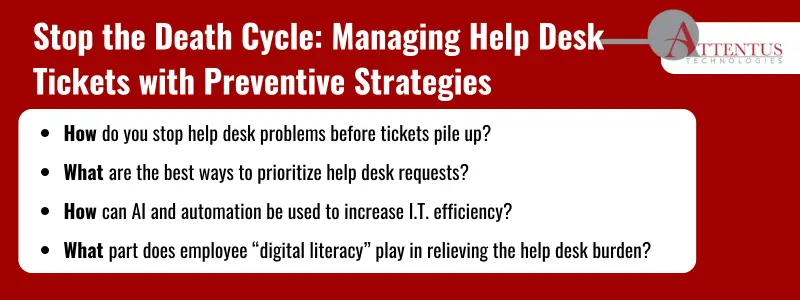
With the rising reliance on help desks, I.T. staff risk becoming buried in a pile of tickets. Many organizations face this conundrum. On the one hand, consumers are more than ever expecting fast, personalized service from I.T. help desks. On the other hand, the average ticket volume has increased by 16% since the pandemic, standing in the way of fast, efficient responses.
If an I.T. help desk is overwhelmed, it becomes reactive, trying to put out the fires and minimize the damage. It’s a far better strategy to deal proactively with problems using superior I.T. management. So, the following are strategies for prioritizing your responses to requests and managing help tickets more effectively. You will be able to head off many problems before they arise.
Identify common I.T. issues
Some of the most common problems I.T. help desks face include:
- Lost passwords
- Lost files and data
- Third-party software issues
- Problems with peripherals
- Computer performance issues
- Connection troubles
- Blue screen of death
- Operating system errors
- Mobile phone issues
- Computer malware
One way to identify the problems your I.T. help desk repeatedly deals with is to implement tracking and analysis tools to gather data insights. This will enable you to apply best practices for ticket handling and develop preventative strategies for managing help tickets.
Setting up a self-help portal with information on everything from dealing with cybersecurity threats to solving connectivity issues to how to reset passwords helps with this task.
Implement preventative measures
Once you identify common I.T. problems, you should address the ones that can be avoided or minimized with the correct preventative measures.
For example, you should ensure that your software is updated to the latest versions, including security patches, to ensure the best performance and improve cybersecurity. All data should be backed up in case of a system malfunction or a hacking issue, such as a ransomware attack.
Diagnostic software could monitor the health of your hardware components, preventing costly breakdowns and interruptions to service. Regular staff training can teach them to use software packages optimally and learn best practices around cybersecurity threats.
Taking such measures can prevent issues before they arise, which can help reduce ticket volume and improve system reliability.
With the right I.T. Managed Service Provider (MSP) partner, you can rely on network experts to monitor your system 24/7, proactively preventing problems. Remote I.T. monitoring services can install a secure software agent on each of your devices, continuously monitoring them and addressing issues before they become risks. This helps to:
- Lessen the burden on your I.T. staff
- Shorten help desk wait times
- Improve user satisfaction
Leverage automation and AI.
Using AI and automation in help desk management can streamline operations, improve customer experiences, boost agent productivity, and reduce the work volume of I.T. staff. For example, you can provide immediate around-the-clock help to users with AI-powered chatbots and virtual assistants.
Help desks can also use AI to analyze incoming support tickets and categorize them by different criteria, such as ones based on urgency, complexity, or order of the tickets received. Or it can route tickets to the agents who are best suited and most available to deal with them.
AI can also speed up how quickly agents respond to help requests by providing suggested advice and specific documents from a knowledge base. Translation capabilities can enable agents to handle requests in different languages.
By using AI and automation tools correctly, you can:
- Reduce support costs
- Make your I.T. teams more productive
- Reduce the number of human errors
- Automate complex workflows
- Help grow and scale your business
- Free up your I.T. team to deal with more complex issues
Foster a culture of I.T. literacy
One way to reduce the burden on your help desk is to promote I.T. literacy across your organization. You can create a culture comfortable with technology through:
- Online courses
- Workshops
- Webinars
- Tutorials
- Podcasts
- Books
- Blogs
Adobe points out: “Digital literacy skills are all about navigating, understanding, and using digital technologies effectively. Suppose you’re looking to increase your digital literacy skills. In that case, you will have to develop your knowledge and skills in a variety of areas, such as online communication, information literacy, and digital content creation.”
Fostering “a culture of experimentation and innovation” can involve getting staff to try new technologies and tools, especially ones that can improve workflows and streamline processes.
You should provide workers with resources to improve their technical knowledge and professional development. This will help them become more comfortable with digital issues and resolve problems before they become help-desk tickets.
Attentus can stop your I.T. desk from getting buried under an avalanche of tickets
Technology is constantly evolving. While advancements can enhance business efficiency and reduce help desk burdens, they can also pose risks if misused by cybercriminals or if there is insufficient internal training and awareness. This can lead to missed opportunities for efficiency and costly mistakes.
Safety and efficiency are key reasons to partner with Attentus Technologies. We provide comprehensive help desk functions and around-the-clock monitoring by skilled staff and advanced technology, allowing you to focus on your business instead of I.T. issues.
At Attentus Technologies, one of our core values is to “seek constant improvement.” As your I.T. needs change, we offer evolving solutions to anticipate and meet challenges. Our commitment ensures the best methods for preventing problems, increasing efficiency, boosting user satisfaction, and managing help desk tickets effectively.
For a free consultation and technology assessment, contact Attentus Technologies today.
